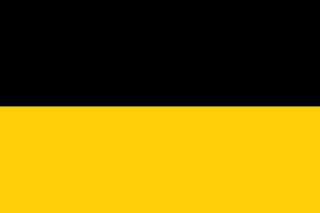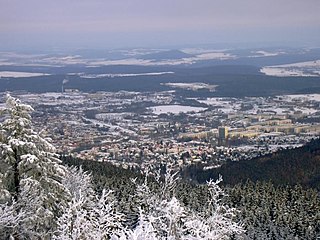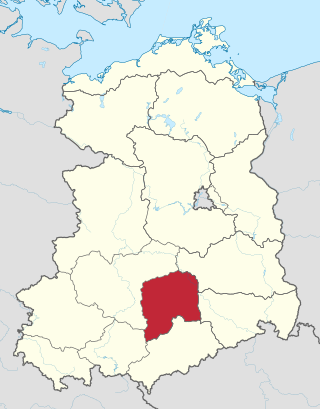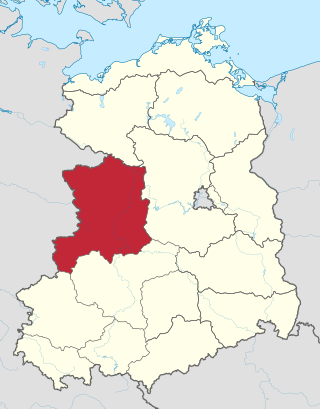
Thuringia, officially the Free State of Thuringia, is one of Germany's 16 states — with 2.1 million people its 12th-largest by population and with 16,171 square kilometers its 11th-largest in area.

Weimar is a city in the German state of Thuringia, in Central Germany between Erfurt to the west and Jena to the east, 80 km (50 mi) southwest of Leipzig, 170 km (106 mi) north of Nuremberg and 170 km (106 mi) west of Dresden. Together with the neighbouring cities of Erfurt and Jena, it forms the central metropolitan area of Thuringia, with approximately 500,000 inhabitants. The city itself has a population of 65,000. Weimar is well known because of its cultural heritage and importance in German history.

The Province of Saxony, also known as Prussian Saxony, was a province of the Kingdom of Prussia and later the Free State of Prussia from 1816 until 1944. Its capital was Magdeburg.

Ilmenau is a town in Thuringia, central Germany. It is the largest town within the Ilm district with a population of 38,600, while the district capital is Arnstadt. Ilmenau is located approximately 33 km south of Erfurt and 135 km north of Nuremberg within the Ilm valley at the northern edge of the Thuringian Forest at an elevation of 500 metres.

Blankenhain is a town in the Weimarer Land district, in Thuringia, Germany. It is 14 km south of Weimar.
The administrative divisions of the German Democratic Republic were constituted in two different forms during the country's history. The GDR first retained the traditional German division into federated states called Länder, but in 1952 they were replaced with districts called Bezirke. Immediately before German reunification in 1990, the Länder were restored, but they were not effectively reconstituted until after reunification had completed.

The Bezirk Potsdam was a district (Bezirk) of East Germany. The administrative seat and the main town was Potsdam.

The Bezirk Dresden was a district (Bezirk) of East Germany that lasted from 1952 to 1990. Dresden would be reabsorbed back into Saxony after the reunification of Germany. The administrative seat and the main town was Dresden.

The Bezirk Leipzig was a district (Bezirk) of East Germany that would last from 1952 to 1990. Leipzig would be reabsorbed into Saxony after the reunification of Germany. The administrative seat and the main town was Leipzig.

The Bezirk Karl-Marx-Stadt, also known as Bezirk Chemnitz, was a district (Bezirk) of East Germany. The district existed from 1952 until the Reunification of Germany in 1990. The administrative seat and the main town was Karl-Marx-Stadt, renamed back to Chemnitz during the reunification of Germany.

The Bezirk Frankfurt, also Bezirk Frankfurt (Oder), was a district (Bezirk) of East Germany. The administrative seat and the main town was Frankfurt (Oder).

The Bezirk Rostock was a district (Bezirk) of East Germany. The administrative seat and the main town was Rostock.

The Bezirk Magdeburg was a district (Bezirk) of East Germany. The administrative seat and the main town was Magdeburg.

The Bezirk Halle was a district (Bezirk) of East Germany. The administrative seat and the main town was Halle.

The Bezirk Schwerin was a district (Bezirk) of East Germany. The administrative seat and the main town was Schwerin.

Bezirk Cottbus was a district of the German Democratic Republic. The administrative seat and main town was Cottbus.

The Bezirk Gera was a district (Bezirk) of East Germany. The administrative seat and main town was Gera.

The Bezirk Neubrandenburg was a district (Bezirk) of East Germany. The administrative seat and the main town was Neubrandenburg.

The Bezirk Suhl was a district (Bezirk) of East Germany. The administrative seat and the main town was Suhl.

Erfurt – Weimar – Weimarer Land II is an electoral constituency represented in the Bundestag. It elects one member via first-past-the-post voting. Under the current constituency numbering system, it is designated as constituency 192. It is located in central Thuringia, comprising the cities of Erfurt and Weimar as well as the municipality of Grammetal from the Weimarer Land district.





















